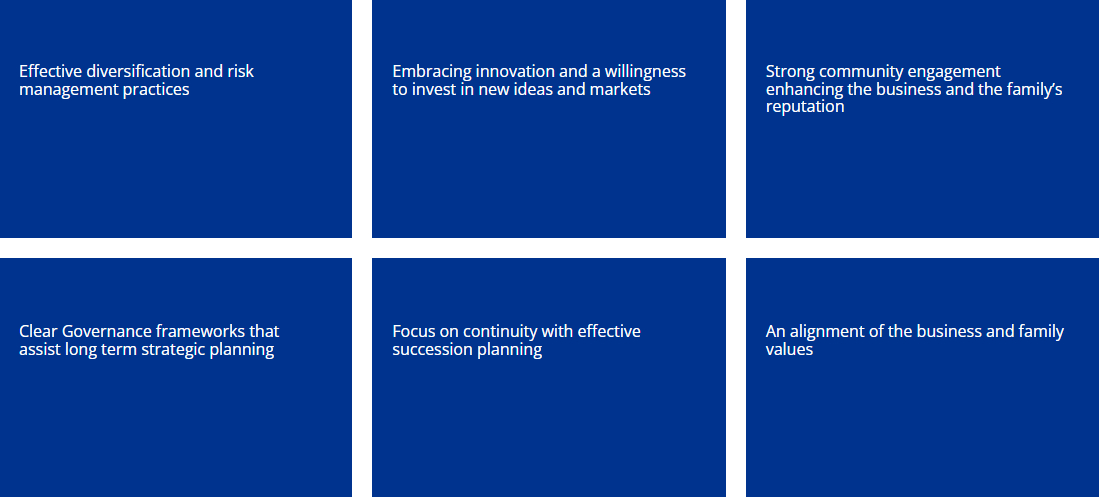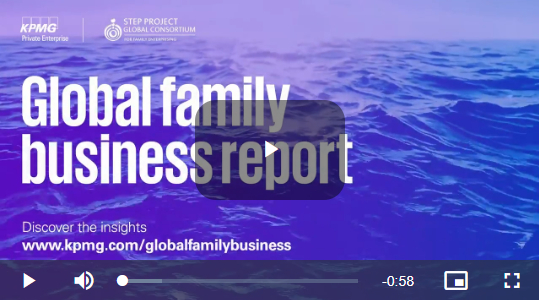- within Corporate/Commercial Law topic(s)
- in United States
- within Strategy and Environment topic(s)
- with readers working within the Property and Retail & Leisure industries
How can your family business build long term growth and sustainability?
Growth matters for any business – it is essential for building prosperity and sustainability. However, for family businesses, how you grow matters beyond sales and bottom-line profit. Success is multi-faceted involving not just financial performance, but social responsibility and environmental impact underpinned by the legacy and identify of the family, its purpose and values.
Family businesses continue to play a significant role in shaping Saudi Arabia's private sector in 2025, driving growth, innovation and long-term resilience. Comprising over 95 percent of private enterprises and contributing 66 percent to the sector's GDP, these businesses are attracting increasing attention for their resilience, governance and long-term sustainability.
KPMG Global Family Business 2025
Our latest research report prepared in collaboration with STEP Project Global Consortium and KPMG Private Enterprise using data collected from 2,683 businesses from over 80 countries provides a deeper understanding of the core drivers of family business growth – effective governance and leadership, a focus on sustainability across generations and the capacity for strategic investment to enhance performance.
Specifically, this report considers:
- "Why growth and value creation matter" and "what constitutes good growth?";
- What are the characteristics of boards of high performing businesses and how their composition influences future growth;
- The correlation between high performance and sustainability and the impact of multi-generational engagement; and
- How "Growth" capital and M&A activity can be harnessed by family businesses keen to diversify their markets and secure the foundations for future growth.
Download the executive summary
Key facts and figures
67%
of High Performing businesses had formal boards (10% more than the total sample).
32%
of the 2,683 of the businesses surveyed reported "High Performance" relative to their peers.
48%
exhibited High Sustainability of these 70% had formal boards and over 80% reported High Performance.
46%
had high levels of transgenerational entrepreneurship (TES) of these 46% reported high performance 43% more than the global sample.
Creating value through 'good growth'
Long term value creation within a family business requires careful consideration of the business' financial performance, sustainability and capacity to generate 'good growth'.
Growth which is unplanned can have a disruptive effect leading to an erosion of value and potential conflict with 'family values'. In short, how you grow matters.
Value creation through growth is crucial for a family business because it ensures long term sustainability and ultimately the successful transition of the business across generations.
Family businesses should focus on:

Characteristics of high performing boards
Good Governance is crucial for the growth of a family business because it establishes clear decision-making processes, reduces conflicts and ensures long-term sustainability.
Our research underlined the relevance of formal boards in enhancing business performance and found that High Performing businesses were more commonly large scale (more than 250 employees) as against the global sample.
We also found that the characteristics of the boards of High Performing businesses included nearly one quarter of seats being occupied by non-family members and nearly one third being female.
How High Sustainability generates high performance
For many sustainability practices are 'business as usual' with a focus on the long term being deeply ingrained. However, developing deliberate approaches to sustainability is increasingly becoming a strategic priority for family businesses.
Importantly, we found 80% family businesses that were positively engaged in their community, the environment, their employees and suppliers, and consequently, displayed "High to Medium" levels of sustainability, also reported High Performance.
Nearly 70% of High Sustainability businesses also had formal boards, 15% more than the global average.
However, work still needs to be done on measuring their impact at an environmental level with less 50% considering they were able to do so.
Fostering 'growth' through M&A and Private Equity
Growth capital is essential for family businesses to scale operations. It provides fuel to help scale business operations, expand into new markets, fund innovation and enter long- term strategic investment opportunities.
Increasingly, Family Businesses have recognized the opportunity to source 'growth capital' from third parties, keen to work with family-owned enterprises such as private equity funds and other private providers of capital, like family offices.
Private Equity 'growth capital' has the potential to add not just financial capital but the chance to 'leverage' expertise and enhance operational performance
For family businesses, it is important to find the right partners, understanding the value they are looking to gain from engagement and being willing to undertake 'due diligence' on such issues as cultural fit.
Family businesses have long formed the foundation of the economies in the Gulf region, contributing significantly to employment, innovation, and national identity. But as we enter a new era of economic transformation in many of these geographies, these businesses face an urgent need to modernize their governance structures, diversify their investments, and embrace the next generation of leadership. Succession planning is no longer optional—it is a strategic imperative.
Abdullah Akbar
Head of Private Enterprise and Family Business; Head of Board
Leadership Centre
KPMG Middle East
Our research identified that M&A activity was becoming an increasingly important priority for family businesses. Nearly 500 of the family businesses in our survey had undertaken acquisitions in the last three years.
We measured the marginal effect on performance of M&A activity and found that on average, these businesses had a 14% higher business performance than those that had not engaged in M&A activity.
In understanding the key attributes of family businesses undertaking M&A activity we found that 63% of acquisitions were targeting family businesses and that those businesses undertaking M&A activity were:
- Larger scale than the global average.
- Led predominantly by Baby Boomer CEOs.
- 73% had formal boards.
- With greater levels of independent representation.
Global Family Business Report 2025
Don't miss the opportunity to gain valuable insights from our comprehensive report that delves into the core drivers of growth for family businesses. Download the full report or the executive summary today and discover how effective governance, sustainability, and strategic investment can propel your family business toward long-term growth and success.
To learn how KPMG Private Enterprise can help assist your family business review our range of services and contact (local representatives).
The content of this article is intended to provide a general guide to the subject matter. Specialist advice should be sought about your specific circumstances.


